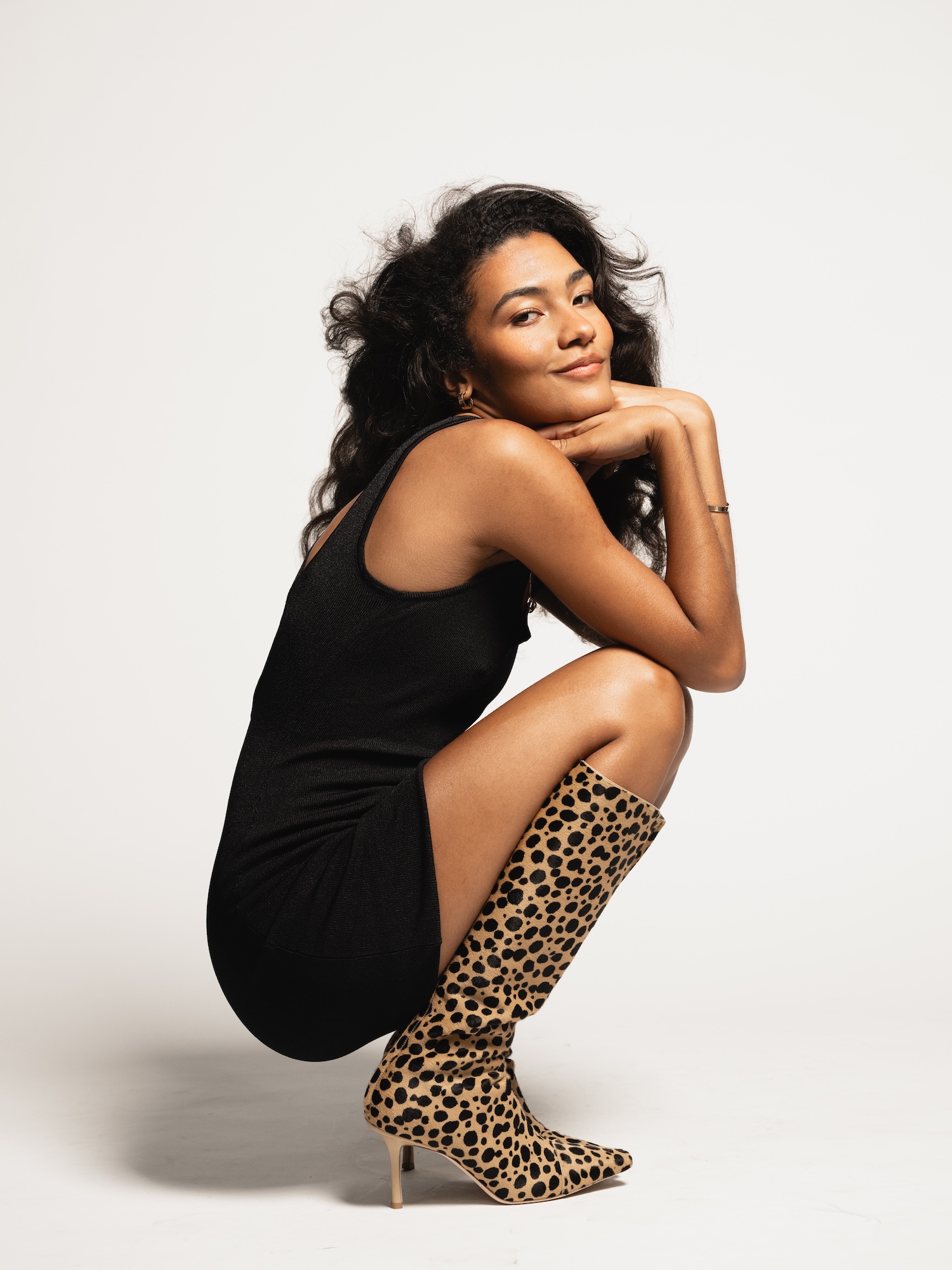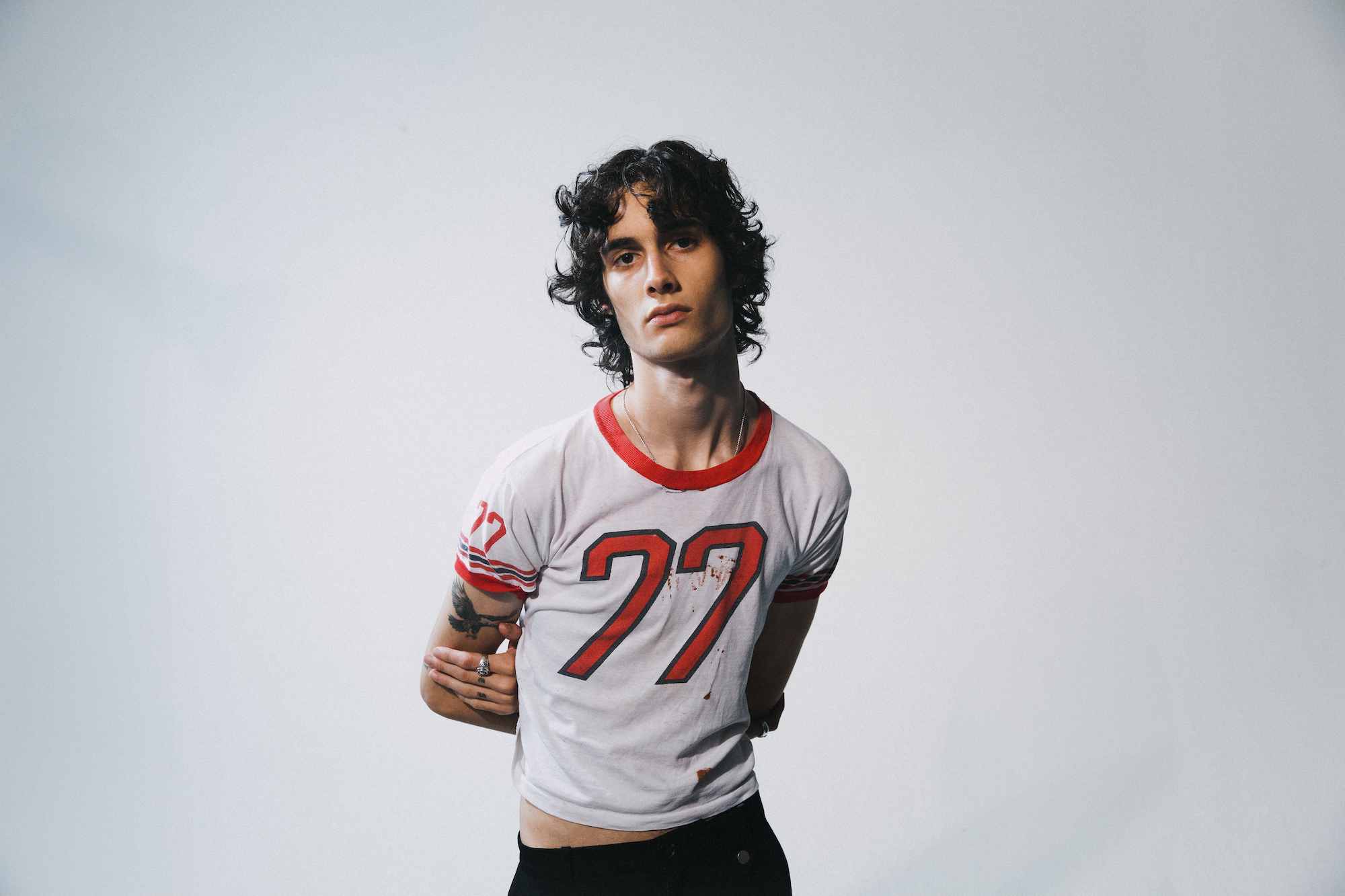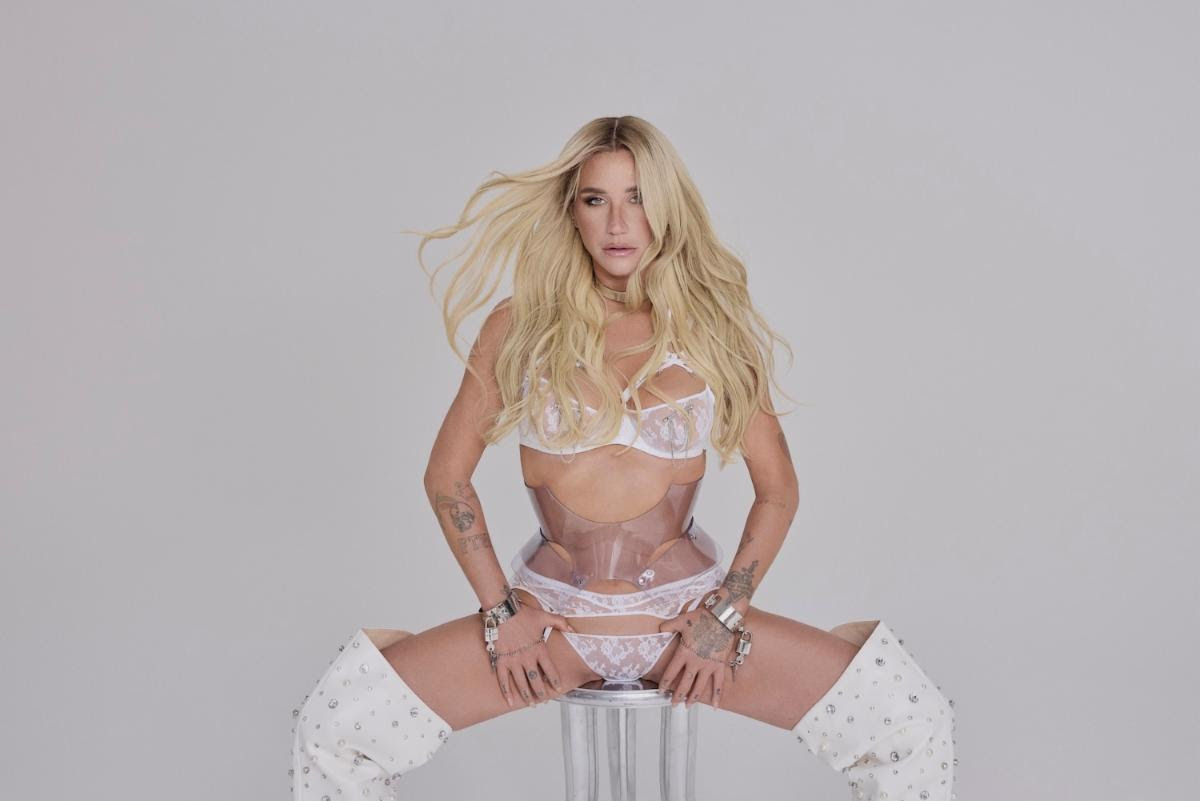If Halsey's The Great Impersonator project comes off as defensive, it's because they've earned it. Their debut album, Badlands, came out almost 10 years ago, but Halsey has yet to be fully received with the kind of gravitas one might reasonably expect after a decade-long career. This goes back to the start. Early single "New Americana," an earnest (for better or worse) song about a particular kind of millennial experience, was received as Girls-esque parody. A claim went around that Halsey identified their sexuality and neurodivergence with the flippant label "tri-bi," a rumor Halsey called "the dumbest shit I've ever heard." And scads of early press profiles likened them to "a millennial grown in a lab" and "a superstar you can own" – dismissive, boomeresque takes that have nevertheless stuck to Halsey ever since. Even their creative breakthrough, the 2021 Trent Reznor collaboration If I Can't Have Love, I Want Power, had a nagging undercurrent of reality: coincidentally or not, their music was never fully taken seriously until a male auteur got involved.
The Great Impersonator, Halsey's follow-up, is their attempt to get ahead of all the criticism. Rather than try to beat the chameleon allegations, they leaned into them, promoting the album with a pop-Cindy Sherman photography series in which she dressed up as the musicians who inspired particular songs. This is all too easy to read as a pure gimmick: the perfect blogbait for Halloween costume season! But Halsey is making actual points here. The artists they chose for the project – e.g., Kate Bush, Aaliyah, PJ Harvey – are not arbitrary. They're artists with big institutional credibility (and yes, this is partly Halsey's bid to join their ranks someday). But they're also pretty personal choices. It makes total sense that Halsey, a New Jersey native, would idolize Bruce Springsteen. The late Dolores O'Riordan famously sang with the vocal affectations now called "cursive voice" and was dismissed for them just as much at the time; you can hear those stylings in Halsey's vocals, and it may be a deliberate influence. And Amy Lee of Evanescence, who is not normally included in such pantheons, has gotta be a pick from their formative teenage years.
Most importantly, most of these artists are infamous for being musicians that rising artists are frequently compared to, generally unfavorably. Some of them were even pitted against each other; also on the list is Tori Amos, who had to fight off plenty of accusations in her early career that she was a Kate Bush impersonator. Basically, Halsey's tired of being compared to damn Britney Spears (and everyone else). The catch, of course, is that by associating each song with another artist, Halsey invites listeners to do just that. It's a reductive way to hear the album – but it's both unavoidable and textual, so let's just do it. If Halsey's grunge snarl on "Dog Years" doesn't immediately evoke Polly Jean Harvey, the whispered, menacing, quasi-sexual chorus makes the "Down By The Water" connection obvious. "The Great Impersonator" isn't anywhere near the wild whirl of a Björk single, though the strings do hint at "Human Behavior" and "All Is Full Of Love"; but Halsey quirks up her vocal in an honestly pretty accurate impression. Halsey's "Lucky" just interpolates the Britney song outright.
Other connections are more vibes-based: "Panic Attack" and "Hometown" are slinky and twangy like Stevie and Dolly respectively, and the resemblance ends there. Some baffle me completely. As a lifelong Kate Bush stan, I'm not sure what in "I Never Loved You" is meant to be Katelike – the layered background vocals at the end are faintly reminiscent of the Trio Bulgarka spots on The Sensual World, maybe? "Arsonist" has Fiona Apple's swagger and characteristic turns of phrase – "Your human starter kit came incomplete" is the kind of pileup of crunchy syllables Apple would make a meal of. But the arrangement shares little with Apple's catalog, except that producer Thelonious Martin's drum loops sound like something off the Mike Elizondo version of Extraordinary Machine. The actual Tori Amos ballad on The Great Impersonator, despite what the credits are telling you, is "Darwinism"; the ominous minor-key piano line and Halsey's plaintive, hovering vocal recall Tori's late-career slow burns like "Smokey Joe" and "Starling." The withering "Life Of The Spider," meanwhile, sounds like someone trying to write a Tori Amos ballad based on a vague recollection of pianos and feminine pain. (To be fair, the track is labeled as a draft and obviously is one.)
Decoding all these impressions is all well and good, a fun ARG for Lilith Fair enjoyers; but if you get too deep into the rabbithole, you'll miss what else The Great Impersonator is doing. If they wanted to mimic other artists exactly, there's AI technology for that. Instead, Halsey sounds like Halsey no matter what vocal costuming she adopts. (Just saying, this persistent thing where Halsey keeps sounding like Halsey would seem logically at odds with the accusation that they don't have a coherent musical identity.) More pertinently, Halsey's themes aren't drawn from their impersonatees. The record continues the confessional songwriting threads they've pulled at for years: the tolls of growing up amid a fucked-up family, living as a celebrity among tabloid gawkers and parasocial priers, longing for but struggling to claim a solid sense of self, and generally pulling oneself out of one dark place after another, alone.
Other themes are new. Halsey had a son with screenwriter Alex Aydin in 2021; the two broke up in 2023, making her a single mother. And earlier this year, Halsey revealed that in the interim between albums, they were also diagnosed with lupus and a rare T-cell disorder, and were subsequently in and out of hospital: "Long story short, I'm lucky to be alive." The Great Impersonator is a direct response to these challenges: the stark necessity of being there for your child when you haven't been there for yourself, and the paradox of spending years wanting to die and then facing the real, looming prospect of death. Nowhere is this more explicit than the thematic core of the record, the "Letter To God" trio.
Each of these tracks is a vignette from a different point in Halsey's life (maybe fictionalized, maybe not) and a variation on one hook. The arrangements are not musically showy or fleshed-out, nor the most clear homages to their respective artists; the point is to get out of the way of the lyrics. "1974" is an impulsive childhood prayer, prompted by watching a classmate with leukemia be loved and cared for: "Please, God, I wanna be sick." The song is authentically childlike – among kid-Halsey's observations is that their friend "didn't have to clean his room, it was enough to be alive" – and an, uh, brave thing to put on record. But the childishness exists to directly set up "1983," in which Halsey revisits this incident after her diagnosis: "I never would have said it if I knew I'd have to wait until the moment I was happy, then it all disintegrates."
We rely on reader subscriptions to deliver articles like the one you're reading. Become a member and help support independent media!
"1983" is also diegetic: after railing at God that "I don't want to be somebody you want to get rid of," she snaps back into performer mode, chirping "Thank you!" to a cheering crowd. The detail is a stronger knife twist than any explicit lyric about parasociality would be, but Halsey has a deeper cut still. "1998" is an expression of love to their son with a fatalistic undercurrent: "I don't ever wanna leave him, but I don't think it's my choice." The track is assigned to Aaliyah, who tragically did die young. I don't want to read too much into this (Halsey said the connection was just that both "1998" and "Are You That Somebody" have babies cooing), but that doesn't seem accidental. The applause from "1983" is replaced with several seconds of silence, and the melody is funeral in a way Aaliyah melodies aren't. All these are choices.
The Great Impersonator is an ambitious record that attempts many things. The record delivers lots of Alex G and Greg Kurstin-produced pop-rock throwbacks, pastiches many diverse artists who aren't easy to pastiche well, and excavates a lot of real pain in a way that's often hard to listen to. Not all of it works (that one blood-type line has been singled out enough, but I mean, oof). It's the rare "most personal album yet" that actually sounds like it is.
POP TEN
Lady Gaga - "Disease"
Fact: "Bloody Mary," a random gothy deep cut from Lady Gaga's Born This Way, has more Spotify streams than "The Edge Of Glory" and "You And I" combined. Yes, this is mostly because "Bloody Mary" was a viral TikTok trend and those singles weren't. But it's also an indication that people like Lady Gaga when she gets dark and weird. Fittingly, Gaga's latest single evokes "Bloody Mary" and the other industrial goth-rockers on Born This Way ("Heavy Metal Lover" and "Government Hooker"), plus the morbid themes of The Fame Monster and the confrontational, fuck-you-if-you-wanted-this-to-be-tasteful stance of ARTPOP. "Disease" is genuine camp, in that Gaga plays the vampiric sexy medsploitation absolutely serious. Like Camila Cabello's "I LUV IT" (which, to be clear, "Disease" sounds nothing like), it's a big provocative lead single that practically dares people to call it awful. I will not do that. This is exactly what I want Lady Gaga to sound like.
Sophie Ellis-Bextor - "Freedom Of The Night"
Speaking of viral hits, Ellis-Bextor's single "Murder On The Dancefloor" had such a big resurgence that it became her first US chart hit over 20 years after it came out. Suddenly, there's now a big potential audience for a late-career Ellis-Bextor single; what a world. And the single is a good one: a disco throbber that's like "Bittersweet" gone Moroder.
Addison Rae - "Diet Pepsi"
Addison Rae has finally made the jump from being an Ark Music meme of a pop star to being a legitimate, actual pop star. That's because the music is finally there. (Thanks, Charli XCX "mentorship"!) Like its caffeinated counterpart "Espresso," "Diet Pepsi" is breathy, artificially sweet on purpose, and achieves exactly what it aimed to. Side note: Lana Del Rey has done this strange thing where she's redefined the definition of the term "Americana" in some people's minds to no longer mean roots music but the Lana Del Rey sound. So, "Diet Pepsi" is Americana now. Prescriptivists DNI.
Lawrence - "Whatcha Want"
Disclaimer: yes I know, but "Whatcha Want" is a true successor to Tommy Richman in that this extremely dorky group and very-very-faux-James-Brown track have no business being as good as they are. One generation ago this kind of thing would have been performed by, I don't know. Karmin. Lawrence is an upgrade on every axis.
Rosé - APT. (Feat. Bruno Mars)
Three Blackpink alumni – Jennie, Lisa, and Rosé – are currently competing on the charts. We only have room for one; sorry, stans. (We did cover "Rockstar" a few months ago.) "APT." is the splashiest, and not just because of the big-name feature. The track transforms the blog-dance of the late 2000s into an arena for cheerleader chants (between this and "Hot To Go!", we're one shy of a trendpiece), and Rosé rides the energy all the way through. And while Bruno Mars isn't a perfect fit for this Brat-tiness – his wheelhouse remains trad stuff like "Die With A Smile" – his Cardi B collab "Finesse" proved he can still have fun.
Jennie - "Mantra"
OK, fine, we have room for another, for two reasons. One: "that's that pretty-girl mantra" is a Keri Hilson update that shouldn't work but does. Two: There's a lot of synth cowbell.
Any Gabrielly - "Waste Your Love"
Gabrielly, a Brazilian artist signed to Republic last year, released the panting banger "Sweat" last year. This follow-up is aimed more at the lounge than the dancefloor, but it's equally promising. I might be imagining it, but it sounds like she's taking some cues from Tyla; Gabrielly's more of a belter than Tyla is, but "Waste Your Love" has a similar nonchalant poise.
Carol Doche - "Montego" (Feat. Wiz Khalifa)
Florida singer Doche is the latest signee to onetime Gaga mentor RedOne's label. (Full disclosure: I did not know until five minutes ago that he had a label). Though "Montego" sounds nothing like the producer's best-known work, it does share the same killer impulse to go huge; I wasn't sold on this until the explosive breakdown at 1:04. The chorus is also an astrology tease for our times, sure to make all Leos feel seen (as if they didn't already).
AP Dhillon - "Bora Bora" (Feat. Ayra Starr)
Punjabi megastar AP Dhillon and Nigerian pop star Ayra Star team up for this all-too-short two-country collab. (Three, if you count the titular Bora Bora; four, if you count Dhillon for both India and Canada.) The two leads have palpable chemistry, and the beat packs plenty of booty-shaking groove into the 2:37 runtime.
Dorian Electra - "Only Got Your Number"
Electroclash: it's back, it's been back, and I am a sucker for every single pop single that jumps onto the bandwagon. Dorian Electra's up this time, and his take on it seethes and strobes (literally; major strobe warning on this video); it's downright perverse to be writing about it on the Internet instead of hearing it at 5 am on a bender. Just pretend that this would exist if The Dare didn't.
CLOSING TIME
i hate gay halloween what do you mean you’re chappell roan in the crowd at gov ball pic.twitter.com/g40efk0tqg
— scut farkus ? (@nysydi) October 27, 2024






